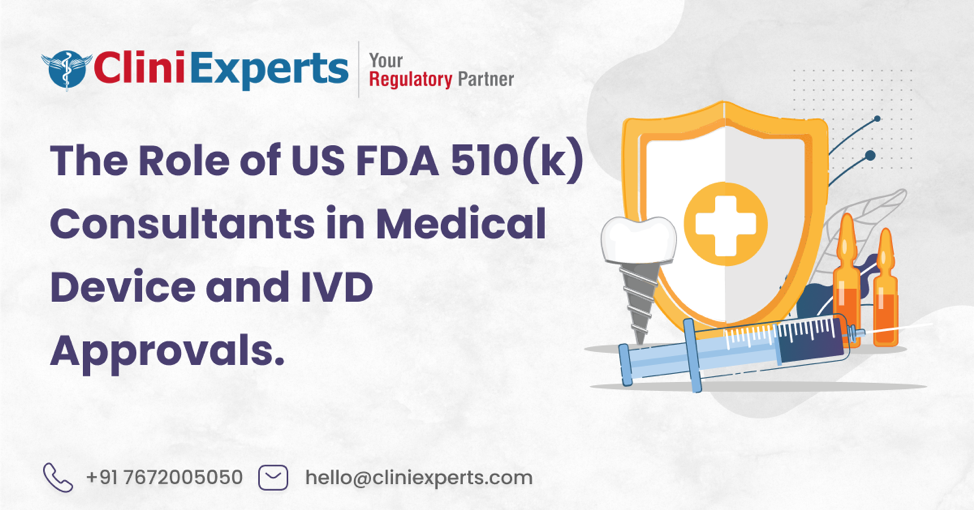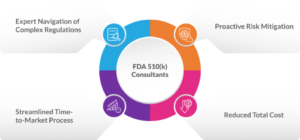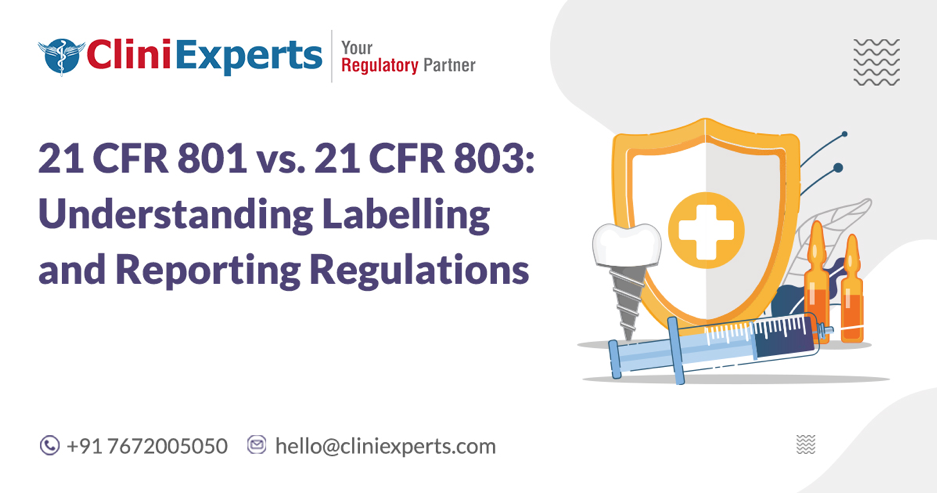The Role of US FDA 510(k) Consultants in Medical Device and IVD Approvals

Summary
- The FDA 510(k) Process is essential for proving device safety and equivalence to existing products in the U.S. market.
- US FDA 510k Consultants guide the manufacturers through regulatory strategy, predicate identification, documentation, and FDA communication.
- Process flow involves classification, predicate selection, submission preparation, FDA reviews, and post-market activities.
- Consultant benefits in streamlining the process, accelerating market entry, saving costs, and reducing compliance risks.
- Consultants develop tailored strategies and ensure submission meets FDA standards.
Short Description
Navigating the U.S. Food and Drug Administration’s (FDA) 510(k) premarket notification process is a critical step for medical device and in vitro diagnostic (IVD) manufacturers aiming to launch their products in the U.S. market.
Engaging experienced US FDA 510k Consultants can significantly simplify this complex regulatory journey, helping manufacturers achieve compliance and market their devices efficiently.
Understanding the Role of 501(k) Proposal
A 510(k) proposal is a submission made by manufacturers to show that their medical device is as safe and effective as an existing device in the market, known as a predicate device.
This is required for Class I, II, or III medical devices intended for human use in the U.S., unless the device qualifies for exemption under the Federal Food, Drug, and Cosmetic Act (FD&C Act) and meets certain exemption criteria outlined in the regulations.
The manufacturer must prove that their medical device or IVD is substantially equivalent to a predicate device by comparing various aspects.
A device cannot be marketed until the submitter receives an order confirming it is substantially equivalent (SE), which signifies that:
- The device has the same intended use as the predicate device and shares the same technological characteristics.
- The device has the same intended use as the predicate device, but:
- It has different technological characteristics that do not introduce new safety or effectiveness concerns.
- The submitted information proves the device is as safe and effective as the legally marketed device.
A successful 510(k) submission results in FDA clearance, granting permission to market the device in the United States.
However, the process demands a deep understanding of regulatory requirements, detailed documentation, and clear communication with the FDA.

Fig. 1: Overview of FDA 510(k) Proposal
Key Responsibilities of FDA 510(k) Consultants
Navigating the 510(k) process can be challenging, which is why regulatory consultants play a crucial role in guiding innovators through it.
These experts help their clients align their regulatory, settlement, and commercialisation strategies, ensuring that medical devices reach the market smoothly and efficiently.
US FDA 510k Consultants bring specialised knowledge of the regulatory landscape, assisting with the submission process and providing valuable insight. Their key responsibilities include:
- Regulatory strategy development: Consultants help create a detailed roadmap tailored to the manufacturer’s specific device, ensuring alignment with FDA expectations. They can also provide insights into the classification of devices and whether a 510(k) submission is required.
- Predicate device identification: Consultants identify suitable predicate devices, forming the basis for demonstrating substantial equivalence. They analyse predicate device documentation to ensure the chosen comparison strengthens the submission.
- Comprehensive documentation preparation: Assistance with compiling device descriptions, labelling, and technical files. Preparation of the summary and certifications required for the 510(k) submission.
- Facilitating FDA communications: Consultants manage all interactions with the FDA, including pre-submission meetings and addressing requests for additional information. They assist in clarifying technical aspects or resolving FDA concerns during the review process.
- Post-Submission Monitoring: Post-submission, the consultant helps in negotiating with the FDA on any required amendments or clarifications and address follow-up actions.
In addition to these, the consultant may guide with the device labelling and help design its marketing strategies.
They can also recommend post-market monitoring strategies to track device performance, ensuring safety and compliance, prepare for FDA inspections and act as FDA liaison to incorporate feedback for improving future submissions.
Below is a table that highlights the process flow for 510(k) submission and the role of consultant at each step. (Table 1)
Table 1: Consulting Process Flow
| Steps | Consultant’s Main Roles |
| Device Classification and Predicate Identification | Assist in identifying the device classification and locating an appropriate predicate device for establishing substantial equivalence. |
| Regulatory Research | Conduct comprehensive research on FDA regulations and requirements applicable to the specific medical device being evaluated. |
| Preliminary Data Assessment | Assess preliminary data to ensure it aligns with FDA requirements for the 510(k) submission, advising on gaps or additional data needed. |
| 510(k) Submission | Guide and prepare the 510(k) submission, ensuring all required documentation is complete, accurate, and aligned with FDA guidelines. |
| Acceptance Review | Support in preparing for the FDA’s review of submission completeness and ensure all aspects of the application meet FDA standards for acceptance. |
| Substantial Equivalence Review | Collaborate with the FDA during their evaluation of the device’s safety and effectiveness, assisting in clarifying or supplementing data if needed. |
| FDA Decision | Advise on strategies for navigating the FDA decision-making process and help interpret the final clearance or feedback. |
| Steps | Consultant’s Additional Roles |
| Post-Clearance Activities | Offer guidance on compliance with post-market regulatory requirements, including preparing for inspections and addressing any follow-up actions. |
| Labelling and Marketing | Ensure that device labelling meets regulatory standards and develop strategies for compliant marketing and promotional activities. |
| Post Market Monitoring | Provide recommendations for ongoing surveillance to monitor the device’s performance in the market and ensure continuous safety and compliance. |
| Regulatory Liaison | Serve as the primary point of contact with the FDA, ensuring smooth communication and addressing any regulatory queries throughout the product lifecycle. |
| Continuous Improvement | Advise on best practices for improving regulatory submission processes, incorporating feedback from FDA reviews, and updating internal practices for future submissions. |
Benefits of Engaging FDA 510(k) Consultants
Involving US FDA 510k Consultants in the submission process offers several advantages for medical device and IVD manufacturers:
- Expert Navigation of Complex Regulations: Consultants have an in-depth understanding of FDA guidelines, which minimises errors in the submission. They stay updated on regulatory changes, ensuring compliance with current standards.
- Accelerated Time-to-Market: Experienced consultants streamline the preparation and submission processes, reducing delays. Their expertise in managing communications with the FDA can help resolve issues promptly.
- Cost Savings: By avoiding unnecessary testing or rework due to submission errors, consultants help manufacturers save resources. Effective planning reduces the likelihood of costly delays.
- Risk Mitigation: Consultants proactively identify and address potential compliance risks. They ensure all aspects of the submission are robust, reducing the likelihood of denials or post-clearance issues.

Fig. 2: Advantages of FDA 510(k) Consultants
Conclusion
In conclusion, FDA 510(k) consultants play a fundamental role in guiding medical device and IVD manufacturers through the regulatory approval process in the United States.
If you’re feeling lost CliniExpert can be your trusted partner for offering expert guidance on FDA 510(k) submissions.
Our support includes overcoming regulatory challenges and maintaining technical documentation, helping manufacturers secure clearance and sustain market access efficiently and effectively while maintaining the highest standards of safety and effectiveness.
References:
- Premarket notification 510K. [Internet] U.S Food and Drug Administration [cited 2024 December 16]. Available from: https://www.fda.gov/medical-devices/premarket-submissions-selecting-and-preparing-correct-submission/premarket-notification-510k
- Holloway K, Miller FA. The Consultant’s intermediary role in the regulation of molecular diagnostics in the US. Soc Sci Med. 2022 Jul;304:112929. doi: 10.1016/j.socscimed.2020.112929 Available from: https://pubmed.ncbi.nlm.nih.gov/32201019/
- Premarket 510 Consulting. [Internet] Clini Experts [cited 2024 December 16]. Available from: https://international.cliniexperts.com/services/usa/premarket-notification-510k-consulting/
- 4. Nwoke, Judith. (2024). Regulatory Compliance and Risk Management in Pharmaceuticals and Healthcare. International Journal of Health Sciences. 7. 60-88. 10.47941/ijhs.2223. Available from: https://www.researchgate.net/publication/383866163_Regulatory_Compliance_and_Risk_Management_in_Pharmaceuticals_and_Healthcare
Contact us
Please feel free to talk to us if you have any questions. We endeavour to answer within 24 hours.



